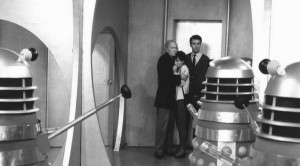Yet other than the lost episodes, the recordings of the actual soundtracks of Doctor Who episodes generally lack narration, meaning that unless the episode is fresh in one’s mind or familiar, some portions may simply be eerie music or sounds that it is difficult to interpret without images to go with them.
For that reason, I chose to listen to the audiobook of the novelization of the second Doctor Who episode, “The Daleks,” released under the title Doctor Who and the Daleks
. The novel was written by David Whitaker, one of the editors who originally worked on the televised episode, and is read by William Russell who played Ian Chesterton. Even so, the novel takes a few major liberties with the story as it aired: it introduces a new manner in which the characters met (this was the first Doctor Who novel to be published, and so perhaps this was felt to be necessary in order to introduce the characters and their circumstances of being together quickly); it makes Susan’s fake surname “English”; it has a glass Dalek as the leader of the Daleks; and it highlights the romantic feelings that develop between Ian and Barbara. Other than these details, the novel largely remains faithful to the spirit of the actual television episode, and in many cases to the precise wording of the dialogue.
 There are a number of aspects of “The Daleks” that could be worth talking about. With World War II a much more recent event, Terry Nation’s script intended to depict the Daleks’ determination to be the sole inhabitants of Skaro in a manner reminiscent of the Nazis. The Daleks are ironically trying to wipe out the blond-haired Thals, who are reminiscent of the ideal Aryan of the Nazis, while themselves not recognizing their own ugliness and deformity – to say nothing of their evil.
There are a number of aspects of “The Daleks” that could be worth talking about. With World War II a much more recent event, Terry Nation’s script intended to depict the Daleks’ determination to be the sole inhabitants of Skaro in a manner reminiscent of the Nazis. The Daleks are ironically trying to wipe out the blond-haired Thals, who are reminiscent of the ideal Aryan of the Nazis, while themselves not recognizing their own ugliness and deformity – to say nothing of their evil.
But the element that struck me most was the Doctor’s remonstration of Ian for his skepticism, his unwillingness to believe that which seems impossible to him. The Doctor views Ian’s skepticism as a failing, and I think there is a discrepancy in how different sorts of skepticism may be viewed by the same people – a discrepancy that is telling.
On the one hand, if someone views claims about superior technology, contact with aliens, or anything else that currently has a science fictional character, they would be considered praiseworthy in what we might call the “skeptical community.”
On the other hand, if someone from an isolated and technologically underdeveloped part of the world were to express skepticism about space travel, modern medicine, or evolution, they would be viewed as having an unwarranted skepticism that simply showed the limitations of their “primitive thinking.”
As I listened to the Doctor berate Ian, I wondered whether one can really have it both ways and be fair.
Surely the same sort of skepticism is being adopted in both cases, the only difference between the one that is viewed with admiration and the one that is viewed with disdain being the way they look based on our own current state of knowledge.
Science fiction authors and fans have often found themselves caught in this tension, viewing those who react to more advanced technology with skepticism as pathetic and primitive, while those who fail to be skeptical of claims about that which is currently – or in the fictional world of the sci-fi story in question – impossible are likewise viewed as credulous and foolish.
Yet ironically, the more recent episodes of Doctor Who have called for increasing suspension of disbelief, as the Doctor’s sonic screwdriver becomes a magic wand that can accomplish anything.
What do you consider the appropriate balance between skepticism and an openness to believing the seemingly impossible? Does the line conveniently run along the edge of our current scientific knowledge? Ought it to be situated there, and if not there, then where?
Speaking of edges, the next episode will be “The Edge of Destruction”!













